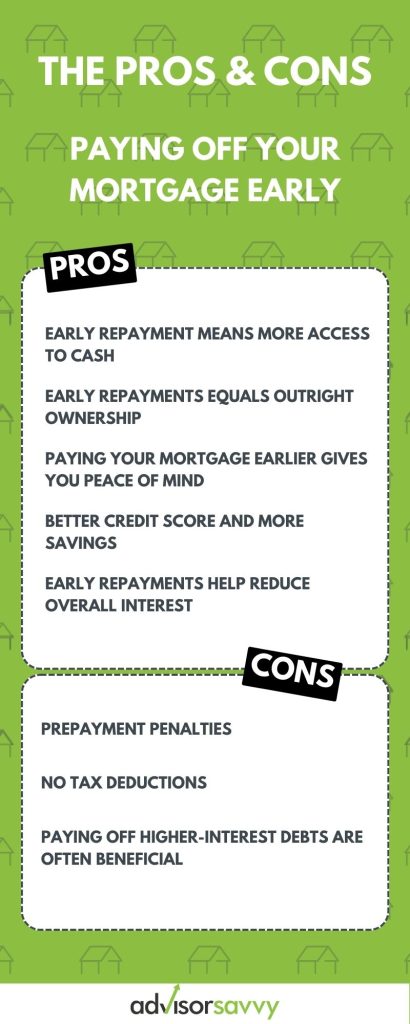
Paying off a mortgage early in Canada can be an immense financial milestone for many. After all, the journey of fully owning a home can take a lifetime. However, early repayment on a mortgage isn’t as simple as paying the balance. Often, banks have certain conditions surrounding early repayment. In addition, there are considerations for your credit score and other aspects of your personal finances. In this article, we will answer these important questions. Then, suggest tips to help you avoid making the common mistakes related to paying off a mortgage early in Canada.

Table of contents
- What are the Pros and Cons of Paying Off a Mortgage Early?
- Are You Better Paying Off Your Mortgage Early?
- What is the Trick to Paying Down a Mortgage Early?
- What Happens If I Make a Large Principal Payment on my Mortgage?
- What is the Average Age to Pay Off a Mortgage in Canada?
- Does Paying Off a Mortgage Affect Credit Score?
- Is it Worth Paying Off Mortgage Early Canada?
- Should I Pay Off my Mortgage or Keep Money in Savings?
What are the Pros and Cons of Paying Off a Mortgage Early?
At surface level, paying off a mortgage early in Canada might seem like a great idea. But there are some drawbacks to consider too. While making this payment and getting it off your chest may be tempting, is it the best for you? Below, we consider some pros and cons of paying off a mortgage early in Canada.
Pros of Paying Off Mortgage Early in Canada
Some of the benefits associated with paying for your mortgage earlier include:

Early Repayment Means More Access to Cash
The major advantage of paying off your mortgage early in Canada is that it frees up cash. You no longer have the hefty monthly payments to think about. Instead, you can channel your money into other profitable ventures and investments. If done right, this can translate to more money in the long run, depending on your investments. For example, you can save money for your children’s post secondary education, bulk up your stock portfolio or get a new car. The options are endless when you have the cash to spare.

Match to your perfect advisor now.
Getting started is easy, fast and free.
Early Repayments Equals Outright Ownership
With the way mortgages work, your house will always be at risk until you complete your payments. In other words, if you default on a mortgage due to being laid off or incurring another financial struggle, your home could be repossessed by the bank. So, the more payments you miss, the greater your chances of foreclosure. This means the lender is taking over the property and possibly selling it to make their money back. But, if you make early mortgage repayments, you can own the house outright sooner. That way, even if you find yourself in a tricky financial position, you’ll never lose your home.
Paying Your Mortgage Earlier Gives You Peace of Mind
Debt is one of the primary reasons why people live from pay cheque to pay cheque. A feeling of emptiness comes with knowing all your money goes towards repayments. This is one of the many mental health side effects of carrying the burden of debt.
But, when you clear your mortgage debt early, you can live with more peace of mind. That way, there are no looming consequences hanging over your head. Plus, you no longer have to fear checking your mailbox to avoid seeing a foreclosure notice. It further assures you of financial stability. This is because you are certain your funds are not going to constant loan repayments.
Better Credit Score And More Savings
Paying off your mortgage early in Canada can help your credit score. It shows that you are creditworthy, making it easier to secure future loans. Without the burden of mortgage payments, you can push more money into your savings. That way, you can build an emergency fund or work quicker towards an early retirement. Having this opportunity to save more money can massively impact your future.
Early Repayments Help Reduce Overall Interest
Suppose you owe about $200,000 with a 5% interest rate for repayment over 30 years. Paying off this debt in 20 years automatically reduces the time the interest accrues for. Therefore, you’ll pay less interest over the course of your mortgage.
Cons of Paying Off Mortgage Early in Canada
Now, let’s consider some disadvantages of paying off your mortgage early in Canada:
Prepayment Penalties
This is an additional fee you incur if you pay your mortgage earlier than agreed upon, usually within three to five years. Although not all lenders charge this fee, some do because it hurts their ability to make a profit. Be sure to check with your lender or read your mortgage agreement before making your final decision.
No Tax Deductions
Suppose you use your mortgaged property for business, like a rental. In that case, you can get tax deductions for your mortgage interest. However, if you clear your mortgage early, this no longer applies to you.
Not all mortgage properties can enjoy this tax benefit. Mortgage interest on private residences, for instance, is not tax deductible. In this case, there would be no loss from a tax perspective.

Match to your perfect advisor now.
Getting started is easy, fast and free.
Paying Off Higher-Interest Debts Are Often Beneficial
Sometimes, you are better off paying higher-interest debts first before repaying your mortgage. These include your car loan and credit card debts. This is because these categories of loans usually accrue more interest payments. Thus, the earlier you pay them off, the better. You can always compare interest rates on all your loans and decide which one should be repaid first.
Are You Better Paying Off Your Mortgage Early?
Paying off your mortgage early in Canada can save you from many future expenses. In addition, it feels good to fully own your home and not have any debts outstanding against it. If you can afford to make this payment early, you not only own your home faster, but pay less interest overall.
However, be sure to consider any potential penalties from your bank for paying early. In addition, make sure you don’t need that cash for anything else and you still have an adequate emergency fund. Ultimately, the decision to pay a mortgage early depends on your personal financial situation.
Related Reading: What is the average credit score in Canada?
What is the Trick to Paying Down a Mortgage Early?
There are some tips and tricks that can help you pay down your mortgage early in Canada. Here’s a few:
- Avoid or negotiate pre-payment penalties. Before agreeing to a mortgage, consider any early repayment penalties. If there is a clause in your mortgage agreement, try to negotiate it or remove it entirely with the lender. When you make an early repayment, you won’t be penalized for it.
- Put all extra money towards your mortgage. Did you get a bonus at the end of the year? Or perhaps an inheritance from your grandmother? Instead of spending this extra cash elsewhere, put it towards your mortgage. Anytime you get a windfall or have spare cash, do the same.
- Make one extra payment per year. If you always make one extra payment per year, you can fast track your mortgage. Set aside money for this payment during the year.
- Avoid refinancing. Refinancing can be a great way to get better terms and conditions, plus a lower interest rate. But the truth is, mortgage refinancing is expensive and time consuming. Try to wait until the end of your mortgage term, then refinance when you have to. As long as you’re working on your credit score and personal finances, more favorable mortgage conditions will become available to you.
What Happens If I Make a Large Principal Payment on my Mortgage?
Normally, lump sum payments put towards your mortgage actually goes towards the interest component first, then the principal component. Naturally, banks want to be paid first. However, the specifics depend on your lender and the agreement you have with them. In some cases, you may be able to put a chunk of cash towards the principal, not the interest.
What is the Average Age to Pay Off a Mortgage in Canada?
Recent data suggests the age group with the most mortgage holders is between 45 and 54 years. But, consider that the average mortgage takes about 25 to 30 years to complete. Most tend to obtain their first mortgage in their 20s or 30s. From there, you can expect to be debt free in your 50s.
Does Paying Off a Mortgage Affect Credit Score?
A mortgage is a large debt, and paying it off can impact your credit score. You may think that paying early will positively impact your credit score. But unfortunately this is not always the case.
Early repayment can affect both your credit mix and your credit history. For example, a mortgage is often a good debt in your credit mix, showing diversification. Without them, your credit mix is limited which impacts your score. Plus, without your mortgage, you won’t have consistent, ongoing repayment history on your report. With this aspect dropping off, it can temporarily affect your credit score.
The good news is this is only a minor hit, and your credit score will heal over time. In addition, most care about their credit score to obtain financial products like a mortgage. If you no longer need to apply for a mortgage, your credit score isn’t so important anymore!
Is it Worth Paying Off Mortgage Early Canada?
If you can afford to pay off a mortgage early in Canada, it is definitely worth it. Mortgages tend to be the largest debts held by Canadians. Being free from it can relieve a lot of financial stress and open doors for new financial opportunities.
However, be sure that you don’t need the money for anything else and the other aspects of your personal finances are stable. In addition, be sure to consider any penalties from your bank before submitting the payment.
Should I Pay Off my Mortgage or Keep Money in Savings?
Ultimately, the decision depends on your financial objectives and unique situation. There are a lot of nuances to consider. For instance, if your savings are locked into investments, it doesn’t make sense to sell them and pay off your mortgage. This is because you might incur capital gains tax after selling your investments. In addition, those investments are valuable for retirement and other big financial goals.
Alternatively, if you got a windfall of cash as an inheritance or bonus, it may make more sense to put that money towards your mortgage as opposed to putting it in savings. Although, be sure to consider any pre-payment penalties or other consequences of paying off your mortgage early in Canada.
At the end of the day, it all depends on your circumstances. If you’re still unsure of how to proceed, consider consulting with a financial advisor. We can match you with one, get started by completing this quick questionnaire!
Read More: The Best Financial Planning and Retirement Calculators

